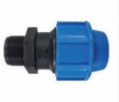Aug . 08, 2024 05:00 Back to list
Exploring the Applications and Benefits of HDPE Pipe in Various Manufacturing Industries
The Utility of HDPE Pipes in Manufacturing
High-Density Polyethylene (HDPE) pipes are widely recognized in various industries, primarily due to their impressive durability, flexibility, and resistance to a range of chemicals. These attributes make HDPE pipes a preferred choice across numerous manufacturing applications, including water supply systems, sewage systems, and industrial operations. This article explores the myriad benefits of using HDPE pipes in manufacturing, emphasizing their growing importance in modern piping solutions.
What is HDPE?
High-Density Polyethylene is a thermoplastic polymer made from petroleum. HDPE is known for its high strength-to-density ratio, making it an ideal material for piping applications. The production process involves polymerizing ethylene gas, which results in a material that is both lightweight and incredibly robust. In comparison to traditional materials like steel, iron, or PVC, HDPE offers several advantages, contributing to its increased utilization in the manufacturing sector.
Key Advantages of HDPE Pipes
1. Durability and Longevity One of the most significant advantages of HDPE pipes is their exceptional durability. They can withstand harsh environmental conditions, including extreme temperatures, UV radiation, and chemical exposure. This longevity translates into lower maintenance and replacement costs over time, making them a cost-effective option for manufacturers.
2. Flexibility HDPE pipes exhibit remarkable flexibility, allowing for easy installation in various configurations. This flexibility is beneficial in applications where complex piping layouts are necessary. Additionally, HDPE's ability to bend without breaking helps reduce the need for fittings and joints, further enhancing the system's integrity.
3. Corrosion and Chemical Resistance Unlike traditional pipes that may corrode over time due to exposure to chemicals, HDPE pipes are highly resistant to a wide range of chemicals. This property makes them suitable for transporting potable water, wastewater, and even aggressive chemicals in manufacturing processes.
hdpe pipe used for manufacturer

4. Lightweight HDPE pipes are significantly lighter than their metal counterparts, which simplifies the transportation and installation processes. This lightweight nature not only reduces labor costs but also eliminates the need for heavy machinery in many cases.
5. Environmental Impact With growing environmental concerns, HDPE pipes are increasingly favored for their sustainability. They are 100% recyclable, and their manufacturing process is more energy-efficient compared to traditional materials. Moreover, using HDPE pipes helps preserve water as they are often more resistant to leaks.
6. Cost-Effectiveness While the initial investment in HDPE pipes may be slightly higher than other materials, the overall life-cycle cost is lower due to their durability, low maintenance requirements, and reduced energy costs during transportation and installation.
Applications in Manufacturing
Due to their versatile nature, HDPE pipes are employed in various manufacturing applications. In the agriculture sector, they are used for irrigation systems, ensuring efficient water delivery while minimizing wastage. In the chemical processing industry, HDPE pipes safely convey hazardous substances without risk of leakage. Additionally, municipal water supply systems and sewage treatment plants increasingly rely on HDPE pipes due to their robust profile and resistance to biofouling.
Conclusion
In conclusion, HDPE pipes play a crucial role in modern manufacturing, offering a combination of durability, flexibility, and sustainability that traditional materials struggle to match. Their wide-ranging applications across different sectors underscore their versatility and economic advantages. As industries continue to seek more efficient and eco-friendly solutions, the adoption of HDPE pipes is likely to rise, further solidifying their status as a critical component in the manufacturing landscape.
-
HORON 25mm PPR Plumbing Pipes: Durable, Leak-Proof Water Systems
NewsAug.15,2025
-
Durable UPVC Column Pipes for Submersible Pumps | Efficient Water Flow
NewsAug.14,2025
-
DN100 PVC Well Casing Pipes - Durable & Corrosion-Resistant
NewsAug.13,2025
-
Flexible 32mm HDPE Pipes in Coil | Durable Water & Gas Lines
NewsAug.12,2025
-
DN50 HDPE Pipes in Coils: Flexible, Durable & Easy Install
NewsAug.11,2025
-
32mm HDPE Pipes in Coil: Durable, Flexible, Easy Install
NewsAug.10,2025

